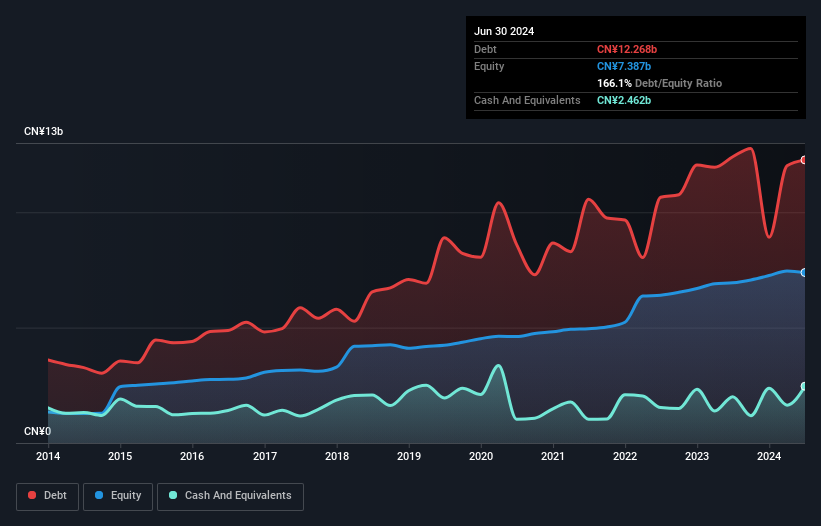
Howard Marks put it nicely when he said that, rather than worrying about share price volatility, 'The possibility of permanent loss is the risk I worry about... and every practical investor I know worries about.' When we think about how risky a company is, we always like to look at its use of debt, since debt overload can lead to ruin. Importantly, NanJing Pharmaceutical Company Limited (SHSE:600713) does carry debt. But is this debt a concern to shareholders?
When Is Debt A Problem?
Debt is a tool to help businesses grow, but if a business is incapable of paying off its lenders, then it exists at their mercy. Part and parcel of capitalism is the process of 'creative destruction' where failed businesses are mercilessly liquidated by their bankers. While that is not too common, we often do see indebted companies permanently diluting shareholders because lenders force them to raise capital at a distressed price. Of course, debt can be an important tool in businesses, particularly capital heavy businesses. The first step when considering a company's debt levels is to consider its cash and debt together.
See our latest analysis for NanJing Pharmaceutical
What Is NanJing Pharmaceutical's Net Debt?
As you can see below, NanJing Pharmaceutical had CN¥12.3b of debt, at June 2024, which is about the same as the year before. You can click the chart for greater detail. However, it also had CN¥2.46b in cash, and so its net debt is CN¥9.81b.

How Healthy Is NanJing Pharmaceutical's Balance Sheet?
The latest balance sheet data shows that NanJing Pharmaceutical had liabilities of CN¥20.1b due within a year, and liabilities of CN¥4.13b falling due after that. On the other hand, it had cash of CN¥2.46b and CN¥19.4b worth of receivables due within a year. So its liabilities outweigh the sum of its cash and (near-term) receivables by CN¥2.37b.
NanJing Pharmaceutical has a market capitalization of CN¥6.51b, so it could very likely raise cash to ameliorate its balance sheet, if the need arose. But it's clear that we should definitely closely examine whether it can manage its debt without dilution.
We use two main ratios to inform us about debt levels relative to earnings. The first is net debt divided by earnings before interest, tax, depreciation, and amortization (EBITDA), while the second is how many times its earnings before interest and tax (EBIT) covers its interest expense (or its interest cover, for short). The advantage of this approach is that we take into account both the absolute quantum of debt (with net debt to EBITDA) and the actual interest expenses associated with that debt (with its interest cover ratio).
With a net debt to EBITDA ratio of 6.0, it's fair to say NanJing Pharmaceutical does have a significant amount of debt. However, its interest coverage of 4.5 is reasonably strong, which is a good sign. We saw NanJing Pharmaceutical grow its EBIT by 3.7% in the last twelve months. Whilst that hardly knocks our socks off it is a positive when it comes to debt. The balance sheet is clearly the area to focus on when you are analysing debt. But it is NanJing Pharmaceutical's earnings that will influence how the balance sheet holds up in the future. So when considering debt, it's definitely worth looking at the earnings trend. Click here for an interactive snapshot.
But our final consideration is also important, because a company cannot pay debt with paper profits; it needs cold hard cash. So it's worth checking how much of that EBIT is backed by free cash flow. Over the last three years, NanJing Pharmaceutical reported free cash flow worth 12% of its EBIT, which is really quite low. That limp level of cash conversion undermines its ability to manage and pay down debt.
Our View
NanJing Pharmaceutical's net debt to EBITDA was a real negative on this analysis, although the other factors we considered cast it in a significantly better light. For example, its EBIT growth rate is relatively strong. It's also worth noting that NanJing Pharmaceutical is in the Healthcare industry, which is often considered to be quite defensive. When we consider all the factors discussed, it seems to us that NanJing Pharmaceutical is taking some risks with its use of debt. So while that leverage does boost returns on equity, we wouldn't really want to see it increase from here. When analysing debt levels, the balance sheet is the obvious place to start. However, not all investment risk resides within the balance sheet - far from it. For example NanJing Pharmaceutical has 2 warning signs (and 1 which is significant) we think you should know about.
When all is said and done, sometimes its easier to focus on companies that don't even need debt. Readers can access a list of growth stocks with zero net debt 100% free, right now.
Valuation is complex, but we're here to simplify it.
Discover if NanJing Pharmaceutical might be undervalued or overvalued with our detailed analysis, featuring fair value estimates, potential risks, dividends, insider trades, and its financial condition.
Access Free AnalysisHave feedback on this article? Concerned about the content? Get in touch with us directly. Alternatively, email editorial-team (at) simplywallst.com.
This article by Simply Wall St is general in nature. We provide commentary based on historical data and analyst forecasts only using an unbiased methodology and our articles are not intended to be financial advice. It does not constitute a recommendation to buy or sell any stock, and does not take account of your objectives, or your financial situation. We aim to bring you long-term focused analysis driven by fundamental data. Note that our analysis may not factor in the latest price-sensitive company announcements or qualitative material. Simply Wall St has no position in any stocks mentioned.
About SHSE:600713
NanJing Pharmaceutical
Engages in the pharmaceutical wholesale and retail businesses in China.
Good value with proven track record and pays a dividend.


